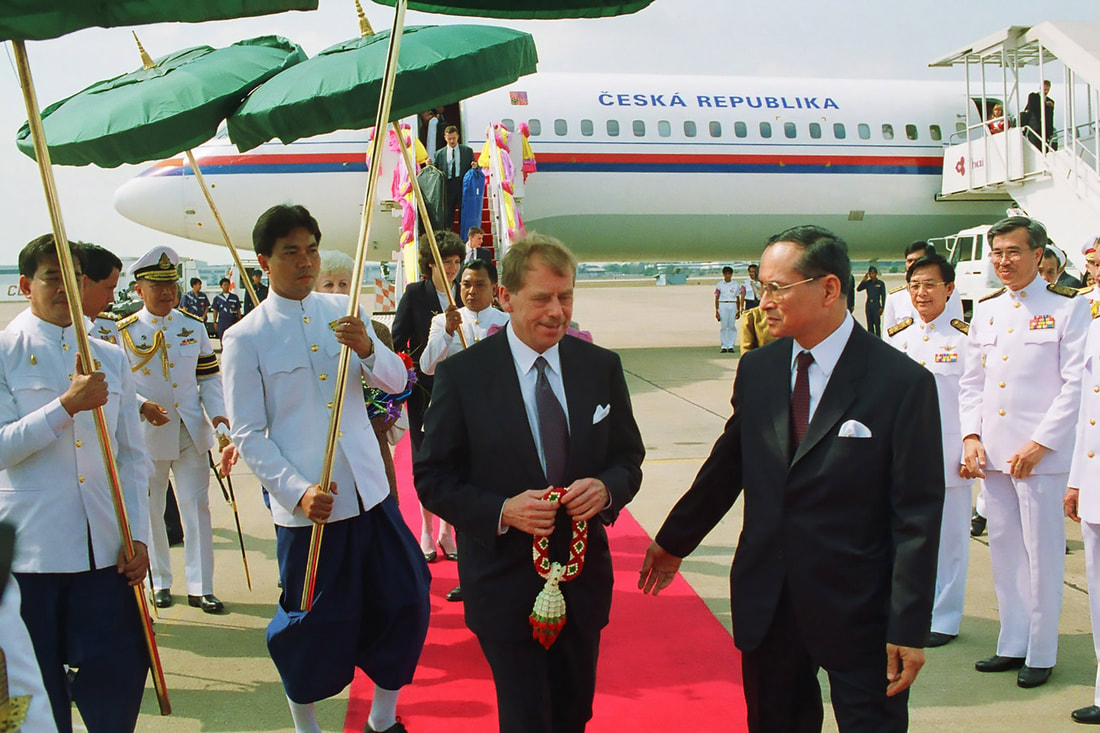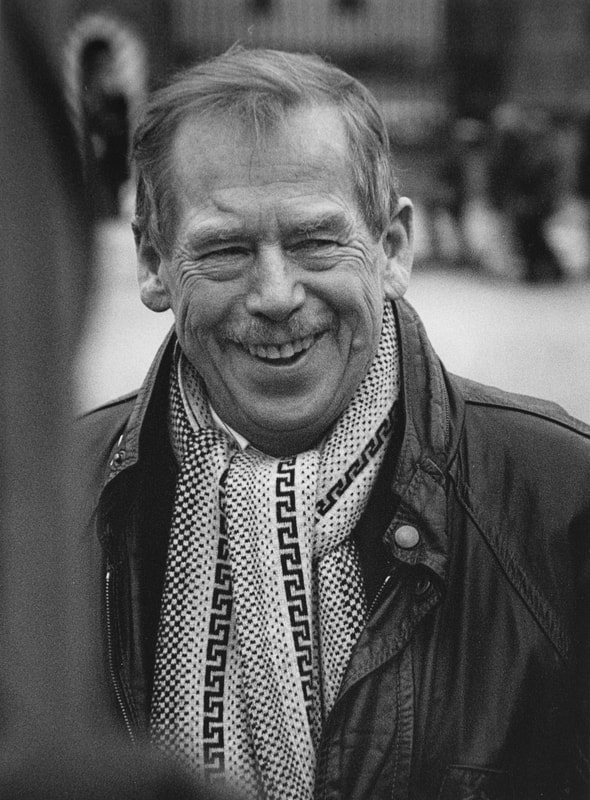To read REPORTER’S NOTEBOOK: REVISITING GREAT STORIES OF THE PAST – PART 3 ONCE BANNED FROM THAILAND, EAST TIMOR’S NOBEL PEACE PRIZE WINNING FOREIGN MINISTER VISITS BANGKOK FOR HIS SON’S WEDDING (PART I) CLICK
Former Czech president Václav Havel, a worldrenowned statesman, playwright and human rights activist, led his countrymen in overthrowing the communist dictatorship in 1989, a dramatic event that contributed to the collapse of other communist regimes throughout Eastern Europe.
Prior to that, as an opponent of the Czechoslovak communists, Mr Havel was arrested several times and spent almost five years in prison. He has been awarded numerous international prizes and honourary degrees, including a Doctorate of Arts from Chulalongkorn University in 1994 and a Medal of Freedom from US President George W. Bush in 2003. Thailand and the Czech Republic this year (2004) celebrated several anniversaries, including King Rama VII’s visit to Czechoslovakia 70 years ago.
Prior to that, as an opponent of the Czechoslovak communists, Mr Havel was arrested several times and spent almost five years in prison. He has been awarded numerous international prizes and honourary degrees, including a Doctorate of Arts from Chulalongkorn University in 1994 and a Medal of Freedom from US President George W. Bush in 2003. Thailand and the Czech Republic this year (2004) celebrated several anniversaries, including King Rama VII’s visit to Czechoslovakia 70 years ago.
| THE INTERVIEW: You made a very successful state visit to Thailand as a guest of the Royal Family in 1994. You cancelled the second visit last month because of a health problem. This must have been a great disappointment for you. I was greatly impressed during that state visit and I have always wanted to come back. Yet I have not been able to do so because of circumstances beyond my control. Most recently I received with great appreciation a letter from His Majesty King Bhumibol Adulyadej wishing me a quick recovery, and also flowers from Her Royal Highness Princess Maha Chakri Sirindhorn. As Thailand is celebrating the birthday of His Majesty, I also wish him all the best. We had an extensive discussion during my visit 10 years ago. After a close follow-up later on, I had great esteem for his outstanding wisdom. I wish to congratulate all the Thai people for having such a great King at the helm of their country because he can embody and effectively protect national unity as well as freedom of conscience, aiming for the peaceful and harmonious coexistence of different religions. |
How have Thai-Czech diplomatic relations developed during the past 30 years?
Relations between our two countries have deep roots. Czech travellers had already visited Siam in the 19th century, while our presidents, Tomáš Garrigue Masaryk and Edvard Beneš, maintained friendly relations with Thailand and King Prajadhipok between the two world wars. Many Czech companies including Škoda and Bataalso had businesses in Thailand at that time. But after the communists took power in Czechoslovakia in 1948, everything came to a halt. Diplomatic relations between our two countries were established in 1974, but good cooperation really only began after the collapse of communism in 1989, when democracy and a market economy were installed again. From that year until now, our bilateral cooperation has been dynamic, especially in the fields of trade and tourism. I hear that Prague has become a popular holiday destination for Thais.
Because of your nomination in 1991, Aung San Suu Kyi subsequently won the prestigious Nobel Peace Prize. What was behind your decision?
Czechoslovakia was then already a free country. And it was important for me to show solidarity with the ones who were less fortunate. I have been able to send letters to Aung San Suu Kyi from time to time, and to obtain some information on her situation even, as you know, this is not easy.
I believe that the world should learn to listen to the Burmese people instead of having them to listen to us. My message to them is: “There are many people in the world who don’t forget you and your people and are ready to listen and to help you, if you wish.”
Cambodia recently approved an agreement with the United Nations on the establishment of a tribunal to punish individuals who committed crimes during the reign of the Khmer Rouge. Do you have any comment on this development?
We in the Czech Republic know very well how complicated and painful it is to come to the terms with the past. But I believe that this is absolutely necessary. Therefore, I welcome the approval by the Cambodian parliament. And speaking of Cambodia, I would like to express my happiness that Prince Norodom Sihamoni has become the new Cambodian King. He speaks Czech fluently and is remembered in Prague as a well-cultivated and kind man.
Relations between our two countries have deep roots. Czech travellers had already visited Siam in the 19th century, while our presidents, Tomáš Garrigue Masaryk and Edvard Beneš, maintained friendly relations with Thailand and King Prajadhipok between the two world wars. Many Czech companies including Škoda and Bataalso had businesses in Thailand at that time. But after the communists took power in Czechoslovakia in 1948, everything came to a halt. Diplomatic relations between our two countries were established in 1974, but good cooperation really only began after the collapse of communism in 1989, when democracy and a market economy were installed again. From that year until now, our bilateral cooperation has been dynamic, especially in the fields of trade and tourism. I hear that Prague has become a popular holiday destination for Thais.
Because of your nomination in 1991, Aung San Suu Kyi subsequently won the prestigious Nobel Peace Prize. What was behind your decision?
Czechoslovakia was then already a free country. And it was important for me to show solidarity with the ones who were less fortunate. I have been able to send letters to Aung San Suu Kyi from time to time, and to obtain some information on her situation even, as you know, this is not easy.
I believe that the world should learn to listen to the Burmese people instead of having them to listen to us. My message to them is: “There are many people in the world who don’t forget you and your people and are ready to listen and to help you, if you wish.”
Cambodia recently approved an agreement with the United Nations on the establishment of a tribunal to punish individuals who committed crimes during the reign of the Khmer Rouge. Do you have any comment on this development?
We in the Czech Republic know very well how complicated and painful it is to come to the terms with the past. But I believe that this is absolutely necessary. Therefore, I welcome the approval by the Cambodian parliament. And speaking of Cambodia, I would like to express my happiness that Prince Norodom Sihamoni has become the new Cambodian King. He speaks Czech fluently and is remembered in Prague as a well-cultivated and kind man.
Behind the story:
Václav Havel’s planned trip to Thailand was cancelled because of an injury sustained in Taiwan and he was flown back to Prague for medical treatment.
Fortunately the interview still went ahead, as my questions were passed on to Havel who returned in a written form. It was obviously very disappointing for me that I was unable to meet a man so universally admired in my native country. I have a feeling it would have been certainly among the most memorable occasions of my life. Unfortunately, two earlier attempts by Havel to get to know Thailand were also marred by health issues.
According to news reports, during his first trip here as the President of the Czech Republic in February 1994 he had to cut his stay short because he slipped in the bathroom of a residence where he was staying and broke a rib.
Shortly before a stopover in Thailand in January 2004, Havel fell ill in India, suffering from a breathing problem that prompted a return to Prague. Havel passed away in the Czech Republic on December 18, 2011.
The nation and the world mourned him, not only as a great statesman and courageous dissident, but also as a great thinker and gifted playwright. One of my favorite quotes from Václav Havel is this: “The tragedy of modern man is not that he knows less and less about the meaning of his own life, but that it bothers him less and less.”
Václav Havel’s planned trip to Thailand was cancelled because of an injury sustained in Taiwan and he was flown back to Prague for medical treatment.
Fortunately the interview still went ahead, as my questions were passed on to Havel who returned in a written form. It was obviously very disappointing for me that I was unable to meet a man so universally admired in my native country. I have a feeling it would have been certainly among the most memorable occasions of my life. Unfortunately, two earlier attempts by Havel to get to know Thailand were also marred by health issues.
According to news reports, during his first trip here as the President of the Czech Republic in February 1994 he had to cut his stay short because he slipped in the bathroom of a residence where he was staying and broke a rib.
Shortly before a stopover in Thailand in January 2004, Havel fell ill in India, suffering from a breathing problem that prompted a return to Prague. Havel passed away in the Czech Republic on December 18, 2011.
The nation and the world mourned him, not only as a great statesman and courageous dissident, but also as a great thinker and gifted playwright. One of my favorite quotes from Václav Havel is this: “The tragedy of modern man is not that he knows less and less about the meaning of his own life, but that it bothers him less and less.”



 RSS Feed
RSS Feed
















